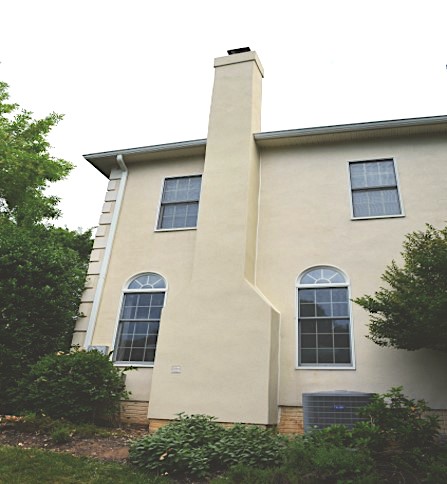A house clad entirely in
stucco is a thing of beauty. There’s no doubt about that.
Many homeowners prefer cloaking their houses with this type of exterior because of its benefits. For one, stucco’s top-notch quality makes it last for a long time.
It is also excellent in hiding flaws, is fungi-resistant, and is naturally equipped with thermo-regulating properties – the house will stay cool during summer and warm come winter season.
Apart from that, stucco resists moisture and is water-resistant. The latter is not an absolute, by the way. Stucco can be susceptible to water damage, too.
Bumps on the surface is an early sign of water damage. If not treated early the delamination will cause parts of it to fall off.
The first step in determining whether there’s a brooding water damage is by asking an expert to perform a moisture test. The stucco expert will then be able to filter out the root cause before performing a treatment.

Stucco Water Damage Causes
Improper stucco composition
The durability of the stucco will come from a well-balanced mixture of Portland cement, sand, and water.
Each ingredient should conform to the standard specification set by the
National Institute of Standards and Technology of the Department of Commerce. Apart from that, the mixture should be cured well to prevent it from cracking.
Faulty stucco installation
No matter how great the quality of the stucco is, if it’s not installed right, the outcome will still be mediocre.
A break in the three-coat stucco (scratch coat, brown coat, and the finish coat) application, for instance, will cause a big problem later on. Same is true for installing stucco directly on a wooden lath.
Unsuitable use of flashing
Flashing acts as a protective barrier between the water and the seams of the house. Aluminum is favored because it’s lightweight and inexpensive. But the possibility of corrosion overrides those benefits. Once it decays, water will easily ooze through the holes.
Cracks
Stress cracks are caused by a lot of factors including earthquakes, direct impact, expansion, or strong winds.
It doesn’t matter whether it’s a hairline crack or a wide pattern crack. The water will still seep through on both.
Stucco Water Damage Solutions
The restoration service company who will provide a solution to your stucco problem should be an expert in stucco water management.
Such company will repair the cause, and not just the symptoms. The latter will only have a Band-Aid effect. A superficial solution will cost you more eventually.
Here are some of the solutions for a water-damaged stucco:
- Applying a drainage plane material to prevent water from entering the wall
- Preventing the migration of vapor by applying a vapor barrier
- Applying a patching compound to the areas of the wall where the loose stucco has fallen away
- Modification of weep screeds to guarantee the proper drainage of water
- Application or improvement of sealants
Stucco water damage restoration cost will vary per case. This will depend on the extent of the damage and the materials that will be used.
Does homeowners insurance cover stucco damage?
The silver lining is that the repair may be covered by your homeowner’s insurance. Typically, whether or not the damage to your stucco is covered depends on the exact cause. Rain and flood damage aren’t covered in many policies, but damage caused by interior water sources, such as a leaking washing machine, are.
We can help you navigate through your insurance policy by working with your insurance company. Talk to one of our
stucco restoration experts today! (703) 283-6886
Source:
http://tscrestoration.com/blog/stucco-water-damage-causes-solutions/


